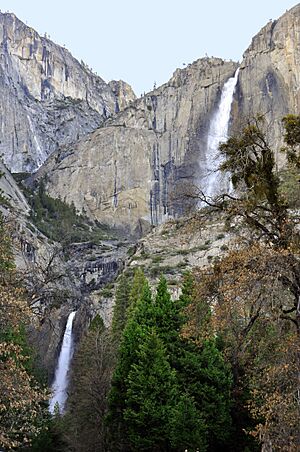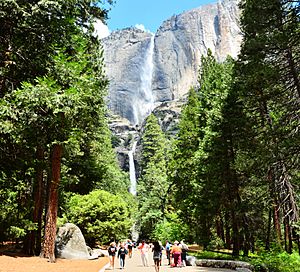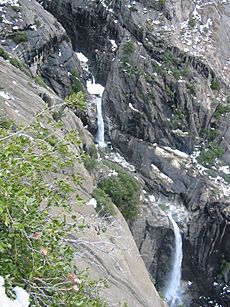Yosemite Falls facts for kids
Quick facts for kids Yosemite Falls |
|
|---|---|

Upper and lower cascades of Yosemite Falls, as seen from Yosemite Valley.
|
|
| Lua error in Module:Infobox_mapframe at line 185: attempt to index field 'wikibase' (a nil value). | |
| Location | Yosemite Valley, Yosemite National Park, California, U.S. |
| Coordinates | 37°45′25″N 119°35′48″W / 37.756845°N 119.596785°W |
| Type | Tiered |
| Total height | 2,425 ft (739 m) |
| Number of drops | 6 |
| Longest drop | 1,430 ft (436 m) |
| Watercourse | Yosemite Creek |
Yosemite Falls is the tallest waterfall in Yosemite National Park, California. It drops a total of 2,425 feet (739 m) from its very top to the bottom. This amazing waterfall is a major attraction, especially in late spring when lots of water flows over it. It's located in the beautiful Sierra Nevada mountains.
Contents
Parts of Yosemite Falls
Yosemite Falls is made up of three main sections. These sections include six different drops where the water falls.
Upper Yosemite Fall
The Upper Yosemite Fall is a huge drop of 1,430 feet (440 m). This is more than half of the waterfall's total height! You can reach the top and bottom of this fall by following trails from the valley floor.
The fast-moving water of Yosemite Creek creates the upper fall. After flowing through a peaceful area called Eagle Creek Meadow, the creek plunges over a cliff. This creates a powerful and loud display of water.
Middle Cascades
Between the Upper and Lower Falls, there are four smaller drops. These are called the Middle Cascades. Together, they drop a total of 675 feet (206 m). This is more than twice the height of the Lower Fall!
Most people in the valley cannot see these cascades. This is because they are in a narrow, hidden gorge. You can see some parts of them from the Yosemite Falls trail. However, it's very important to stay on the trail. The area around the cascades is steep and slippery.
Lower Yosemite Fall
The Lower Yosemite Fall is the final drop, measuring 320 feet (98 m). There's an easy-to-reach viewing area right next to it. This is the most popular spot to see the falls.
After dropping, Yosemite Creek flows out from the base of the Lower Fall. It then joins the Merced River nearby. The area around the bottom of the Lower Fall can be tricky to walk on. There are many loose rocks, and the high moisture makes surfaces very slippery.
Water Flow and Access
Most years, the water in Yosemite Falls stops flowing by late summer or fall. This happens when the weather gets drier.
A few very brave rock climbers have tried to climb the rock face under the falls when the water is gone. This is extremely dangerous. A sudden thunderstorm could make the falls start again, which would be very risky for climbers.
The Lower Yosemite Fall is easy to get to. It's close to the Yosemite Lodge in Yosemite Valley. To reach the top of Upper Yosemite Fall, you can take a challenging 3.5 miles (5.6 km) hike. This trail starts near Camp 4 in Yosemite Valley. You can also reach the top from the Yosemite Creek Trail, which starts from the Tioga Road to the north.
The Ahwahneechee Legend
The Ahwahneechee people are the native people of Yosemite Valley. Their main village was located at the base of Yosemite Falls.
The Ahwahneechee called the waterfall "Cholock," which means "the fall." They believed that the pool at the bottom of the falls was home to spirits of witches, called the Poloti. One Ahwahneechee story tells of a woman who went to get water from the pool. She pulled up her pail, and it was full of snakes! Later that night, the spirits caused a strong wind to pull the woman's house into the pool. The woman and her new baby were taken with it.
Hiking Trails
There are several trails for hikers to explore. The most challenging trail goes to the very top of the falls. It's about 6 miles long and can take two to four hours to climb. This depends on how experienced and prepared a hiker is. The most popular and easiest trail starts at the bridge near the bottom of the Lower Fall.
Park naturalists offer free talks to visitors about Yosemite Valley and Yosemite Falls. They describe the different hiking trails. They also help visitors and explain important safety rules and park regulations.
See also
 In Spanish: Salto Yosemite para niños
In Spanish: Salto Yosemite para niños
 | Jewel Prestage |
 | Ella Baker |
 | Fannie Lou Hamer |



